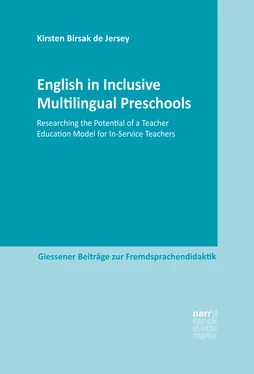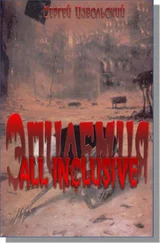Kirsten Birsak de Jersey - English in Inclusive Multilingual Preschools
Здесь есть возможность читать онлайн «Kirsten Birsak de Jersey - English in Inclusive Multilingual Preschools» — ознакомительный отрывок электронной книги совершенно бесплатно, а после прочтения отрывка купить полную версию. В некоторых случаях можно слушать аудио, скачать через торрент в формате fb2 и присутствует краткое содержание. Жанр: unrecognised, на английском языке. Описание произведения, (предисловие) а так же отзывы посетителей доступны на портале библиотеки ЛибКат.
- Название:English in Inclusive Multilingual Preschools
- Автор:
- Жанр:
- Год:неизвестен
- ISBN:нет данных
- Рейтинг книги:3 / 5. Голосов: 1
-
Избранное:Добавить в избранное
- Отзывы:
-
Ваша оценка:
- 60
- 1
- 2
- 3
- 4
- 5
English in Inclusive Multilingual Preschools: краткое содержание, описание и аннотация
Предлагаем к чтению аннотацию, описание, краткое содержание или предисловие (зависит от того, что написал сам автор книги «English in Inclusive Multilingual Preschools»). Если вы не нашли необходимую информацию о книге — напишите в комментариях, мы постараемся отыскать её.
English in Inclusive Multilingual Preschools — читать онлайн ознакомительный отрывок
Ниже представлен текст книги, разбитый по страницам. Система сохранения места последней прочитанной страницы, позволяет с удобством читать онлайн бесплатно книгу «English in Inclusive Multilingual Preschools», без необходимости каждый раз заново искать на чём Вы остановились. Поставьте закладку, и сможете в любой момент перейти на страницу, на которой закончили чтение.
Интервал:
Закладка:
Starting to learn a second / foreign language early can help shape children’s overall progress while they are in a highly dynamic developmental stage in their lives. Starting early also means that learning can take place over a longer period, which may support the achievement of more permanent results in language learning and in other areas of learning. When the young brain learns languages, it tends to develop an enhanced capacity to learn languages throughout life. …
Children who have access to more than one language tend to transfer into the first language / mother tongue the concepts and terms they have learnt through the second / foreign language and vice versa. Hence, language processing in a multilingual mind helps stimulate cognitive competences. …. (pp. 7, 8)
Nevertheless, as competence in the language of instruction is regarded as the key to providing children with equal learning opportunities, early language learning is predominantly associated with the language of instruction in pre-primary settings:
Pre-primary language education aims to offer all children equal opportunities for a good start to the emotional, social and cognitive development resulting from language exposure, taking into account their needs and interests and preparing them for primary school. … Pre-primary education tends to focus on the language of instruction. (p. 10).
As a result of diverse situations and needs, as well as opportunities available to offer, early language learning initiatives to include foreign language learning vary greatly throughout the member states:
With some exceptions, language activities at pre-primary level are not formally structured. There are marked differences in staff competences. Moreover, resources and opportunities are unevenly distributed, both geographically and within different socio-demographic groups. Where an early start in language learning is seen as a key to better opportunities in life but access remains limited, early language learning has become entangled with equity issues: better education often means earlier access to good quality language tuition for the advantaged. In some cases, language learning opportunities are not offered at all in public kindergartens although this does happen in privately-run settings. In others, demand exceeds the available places. Even where opportunities are there, for some children access is more difficult – for example where parents are asked to contribute additional fees for language lessons. Furthermore, early language learning is only provided in a limited number of languages. Diversifying the offer of languages is a challenge linked to local demand, to utilitarian considerations and to the availability of adequate human and financial resources. (p. 9)
While European education policy clearly supports early foreign language education at the preschool level, foreign language education for the preschool is not a priority in Austrian education policy as the following chapter will demonstrate.
2.2.2 Austrian education policy for the preschool level
In Austria the European Commission’s proposal to teach a foreign language at the preschool level became eclipsed by the responsibility and immediate need to focus on the language of instruction - German. The BildungsRahmenPlan , the preschool educational plan for Austria published by the Bundesministerium für Unterricht, Kunst und Kultur (2009a), was published with an extra component dedicated to early language learning which refers entirely and exclusively to German (Bundesministerium für Unterricht, Kunst und Kultur, 2009b). According to the European country report of Austria, the situation is as follows:
Austrian kindergartens further and promote children’s acquisition of the German language above all: this applies both to children with German as a first language, and to children who have a different first language. (Council of Europe, 2008a, p. 36)
Programmes designed to give children of kindergarten age a good start in primary school by ensuring that they have a sufficient level of competence in the language of schooling are high on the agenda of ministries of education and local education authorities. (Council of Europe, 2008b, p. 11)
The final version does not cater for foreign language learning in its early language learning programme. “Systematic foreign language teaching (FLT) at pre-primary level does not lie within the priorities of the Austrian education system” (European Commission, 2011b, p. 7) to the extent that foreign languages are not discussed at all within the compilation of the BildungsRahmenPlan . Foreign language learning was however included in the discussion in the draft of BildungsRahmenPlan . “Beim Fremdsprachenlernen im Kindergarten ist es häufig das vorrangige Ziel, eine Sprache kennenzulernen, die für alle Kinder neu ist. Durch Lieder, Reime, einfache Texte können Klangbild und Aussprache gefestigt werden” (Bundesministerium für Unterricht, Kunst und Kultur, 2008, p. 25). The BildungsRahmenPlan is significant for the implications of foreign language learning initiatives in Austrian state preschools, because it is the legal foundation for the education plan for all Austrian preschools.
The BildungsRahmenPlan was a turning point in the organisation of preschool education. Previously, Austria had a complicated political organisation for preschools because legislation and administration lay within the responsibility and discretion of nine independent federal states. To remedy the situation, the nine federal states signed a Memorandum of Understanding in 2008, which announced a “new legal basis for pre-school education to regulate responsibilities and cooperation between the Republic of Austria and its nine federal countries” (European Commission, 2011b, p. 4). This resulted in the publication of the BildungsRahmenPlan which was compiled in August 2009 (Bundesministerium für Unterricht, Kunst und Kultur, 2009a; 2009b). It did not explicitly rule out that English or any other foreign language could be included in preschools but placed responsibility on the individual preschools both to cater for and to finance any initiative that may take place with no official support provided. As a result, implementation of teaching a foreign language is scarce and varies greatly from preschool to preschool as is the case in other European member states (European Commission, 2011b, p. 9). Given this situation, no support for provision of a consistent foreign language learning curriculum or teacher education programmes that qualify preschool teachers appropriately, are provided. The Country Report referring to Austria simply states that more needs to be offered in the way of other languages in addition to German (Council of Europe, 2008a, p. 86). It would seem that Lower Austria was an exception; however, the financial support of this program was stopped in 2016:
In Niederösterreich, dem größten Bundesland Österreichs, wird Englisch flächendeckend schon im Kindergarten angeboten (vgl. Boeckmann et al. 2011). Außer dem Englischen bezieht dort die sprachliche Bildung ab der Elementarstufe die jeweiligen Nachbarsprachen (Tschechisch, Slowakisch, Ungarisch, Slowenisch, Italienisch) mit ein. Ferner ist vorgesehen … durch andere Familiensprachen, … [die] in der pädagogischen Einrichtung vertreten sind, die sprachlichen Erlebnisse der Kinder zu erweitern. (Sambanis, 2016, p. 173)
My research therefore addresses this situation in early foreign language education through an empirical study that has been conducted in a state preschool. This context can be said to be representative of many state preschools in Salzburg (→ chapter 6.2). The next section will give a more detailed insight in the preschool teacher education in Austria.
Читать дальшеИнтервал:
Закладка:
Похожие книги на «English in Inclusive Multilingual Preschools»
Представляем Вашему вниманию похожие книги на «English in Inclusive Multilingual Preschools» списком для выбора. Мы отобрали схожую по названию и смыслу литературу в надежде предоставить читателям больше вариантов отыскать новые, интересные, ещё непрочитанные произведения.
Обсуждение, отзывы о книге «English in Inclusive Multilingual Preschools» и просто собственные мнения читателей. Оставьте ваши комментарии, напишите, что Вы думаете о произведении, его смысле или главных героях. Укажите что конкретно понравилось, а что нет, и почему Вы так считаете.











